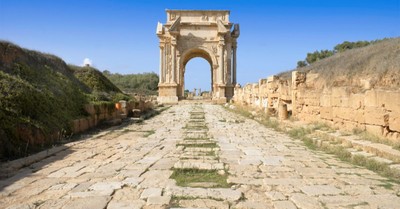Christianity Isn't a "Western" Religion
BreakPoint Daily Commentary


Audio By Carbonatix
By John Stonestreet and Glenn Sunshine, Crosswalk.com
A pair of recent discoveries underscore how quickly and far-reaching Christianity spread in the first century. They also counter the long-standing assumption that Christianity is a just Western thing.
Earlier this month, Egyptian archaeologists revealed the discovery of a 1,600-year-old mural that depicted Jesus healing the sick. Of course, the history of Christianity in Egypt goes way back. The Bible notes the time Jesus spent there with His family, and the Church’s presence there dates back to the time of the Apostles. Less well known is how early and how far Christianity spread into Arabia.
Last month, the United Arab Emirates announced the discovery of a 1,600-year-old stucco plaque featuring a Christian cross. It was found on the island of Sir Bani Yas near Abu Dhabi among the remains of a monastery which had been discovered in 1962. The plaque is a significant discovery for what is the first major archeological dig on the site. It points to an oft-forgotten bit of history: how the Nestorian Church of the East, centered in today’s Iran and Iraq, spread Christianity through the Arabian Peninsula from the fourth through sixth centuries. The monastery was abandoned after the rise of Islam in the eighth century and soon forgotten.
Like the monastery, large swaths of Christian history have also been widely forgotten. Christianity is mostly seen as a Western religion, and the spread of the Church remembered mostly within the Roman Empire. However, until the year 1,000, there were more Christians outside of the old Roman Empire than within it.
Christian missionaries entered the Persian Empire, Rome’s ancient enemy, in the second century and quickly established a church there. In the fourth century, after Constantine’s conversion, fear that Christians would ally with Rome brought severe persecution, but Christianity obtained legal recognition in the fifth century.
Persian missionaries traveling the Silk Road planted churches across Central Asia. The earliest mission was to Bactria in A.D. 196. Missionaries were sent to the Huns in about 500. Entire Turkish and Mongol tribes converted to Christianity during this period, and Central Asia had flourishing Christian communities that were centers of education. By the year 650, there were at least 20 bishops in Central Asia and Metropolitan bishops at Kashgar and Samarkand.
In the early 600s, a Persian missionary named Alopen arrived in China. He was welcomed by the emperor and permitted to open a monastery in the capital. Christianity was accepted as a legal religion there for the next two centuries.
The entire region was conquered by Chinggis (Genghis) Khan in the early 1200s. Though he grew up in a Christian clan, Chinggis was shamanist. But he was also religiously tolerant and friendly to Christians. Over the next generations, several important Mongol leaders also became Christians.
This all changed when some of the khanates converted to Islam. The churches of Central Asia began to decline. Their final demise came in the wake of the Black Death, when Christian communities were scapegoated for the Plague.
Of course, the apostle Thomas first brought the Gospel to India and established churches along the Malabar coast. These churches maintained a distinctive identity alongside Jewish merchant communities and the Hindu community. In A.D. 300, the Indian church connected with the Church of the East, in part because of the Silk Road and other trade routes and in part because of their shared liturgical language of Syriac. Eventually, the church submitted to ecclesiastical oversight from the bishops of the Church of the East. Today’s Mar Thoma church in India exists in continuity with this long history.
Thaddeus and Bartholomew brought the Gospel to Armenia in the first century, and Christian communities were established there by the second century. Despite persecution from the Zoroastrian monarchy, the churches grew with help from missionaries from Persia and Mesopotamia. Ultimately, Armenia became the first kingdom to convert to Christianity in A.D. 301, twelve years before Rome.
In the mid-300s, a Syrian named Frumentius was ordained by the Coptic Patriarch in Alexandria and sent to evangelize the kingdom of Axum in modern Ethiopia. He was a tutor to Axum’s king Ezana, who also converted. The two worked to evangelize the kingdom, making Axum the third Christian kingdom after Armenia and Rome. Ethiopia remains predominantly Christian to this day.
It isn’t surprising that artifacts from this rich history will be found, but when they are, it’s a good reminder of how Christianity spread. It should also remind us that it’s not so much that Christianity is Western, but that Western culture is at root Christian.
Image credit: Credit:©GettyImages/ChristianWilkinson
John Stonestreet is President of the Colson Center for Christian Worldview, and radio host of BreakPoint, a daily national radio program providing thought-provoking commentaries on current events and life issues from a biblical worldview. John holds degrees from Trinity Evangelical Divinity School (IL) and Bryan College (TN), and is the co-author of Making Sense of Your World: A Biblical Worldview.
The views expressed in this commentary do not necessarily reflect those of CrosswalkHeadlines.
BreakPoint is a program of the Colson Center for Christian Worldview. BreakPoint commentaries offer incisive content people can't find anywhere else; content that cuts through the fog of relativism and the news cycle with truth and compassion. Founded by Chuck Colson (1931 – 2012) in 1991 as a daily radio broadcast, BreakPoint provides a Christian perspective on today's news and trends. Today, you can get it in written and a variety of audio formats: on the web, the radio, or your favorite podcast app on the go.








